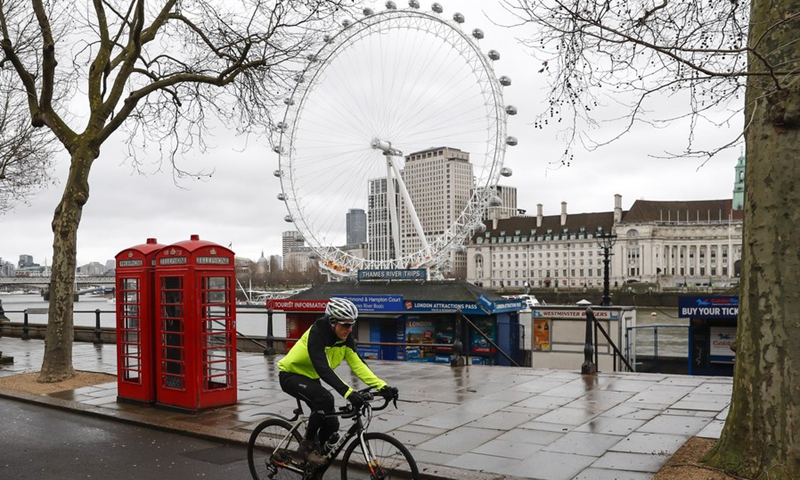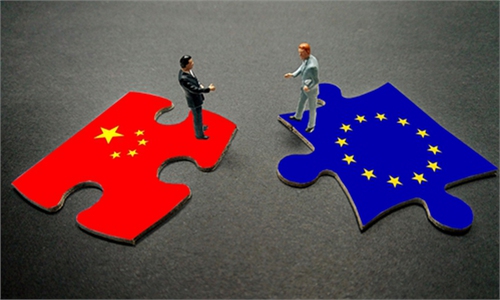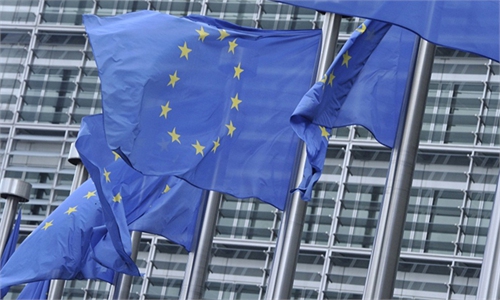Deceitful politicians that harm China-EU ties face sanctions
Having double standards typical for West

A man cycles past the London Eye by the Thames in London, Britain, on Feb. 17, 2021.(Photo: Xinhua)
Chinese experts warned that some double standard anti-China politicians in the West are very likely to be next on China's sanctions list for posting anti-China comments on social media. Meanwhile the EU and the UK announced sanctions on China over human rights issues in Northwest China's Xinjiang Uygur Autonomous Region.
Following the suit of the EU, Canada and the US, the "copycat" UK on Monday imposed sanctions.
One day before the UK's sanctions, UK conservative politician Daniel Kawczynski, also a member of Parliament, tweeted over Hong Kong issues, saying "Watching Thatcher interview after signing agreement with Communist [Party of] China in 1984 for Hong Kong scheduled handover.
Agreement outlined for 50 years from transfer in 1997, dynamics of one country two systems."
Kawczynski accused the Communist Party of China (CPC) of having trashed that agreement, saying "We can't trust them."
According to a media report in June 2020, the conservative politician also pointed his finger at the South China Sea issue, warning that the UK government losing its easternmost military base would be a victory for Beijing.
Li Xiaobing, an expert on Hong Kong, Macao and Taiwan studies at Nankai University in Tianjin, told the Global Times on Tuesday that the politician has misunderstood legal status of the joint declaration.
The declaration is an international legal document, and it has to transition into domestic laws to direct governance. China has included it to the Basic Law of the Hong Kong Special Administrative Region (HKSAR) based on the Constitution, which are two domestic laws China uses to administer the HKSAR, Li told the Global Times.
After the handover, Hong Kong was included into China's national governance system and its jurisdiction became part of internal affairs within Chinese sovereignty, Li said, noting the accusations against China for violating the joint declaration are not feasible.
Some people in the UK wanted China to follow the "one country, two systems" principle in accordance with the agreement they designed, which is impossible. The UK has laid too many landmines and we will sweep them sooner or later, the expert said.
Interestingly, in contrast to his recent anti-China remarks, Kawczynski said "there is huge potential for China-UK cooperation" when being interviewed by the Chinese national daily newspaper Guangming Daily in February 2018.
He noted that one of the most important reasons why China and Russia can co-exist amicably is that both sides follow the principle of non-interference in each other's internal affairs, and focus on trade and security cooperation, which is worthy of study by Western countries.
Having double standards is typical for Western politicians. The British lawmaker knows how to attract attention at a certain time to drive his political career, Li said, noting that "we must be cautious in dealing with Western politicians. Evaluate one's long-term actions, not temporary performance."
Li said Kawczynski could be a candidate for the next round of sanctions. But as China's sanctions are reciprocal, when will his turn come is another matter.
A German politician who is serving as a Free Voters Member of the European Parliament also tweeted on Sunday, using the human rights excuse in Xinjiang and Hong Kong to defame China.
Cui Hongjian, director of the Department of European Studies at the China Institute of International Studies, told the Global Times on Tuesday that such "political speculators" who have long attacked China are very likely to be sanctioned on China's countermeasure list.
China will hit back when Western politicians and countries break the bottom line of China's national interests, Cui noted.
In the context of an anti-China atmosphere, "political speculators" tend to craft publicity stunts by smearing China, which only serves these individuals' own political interests, Cui pointed out.
As attacking China-related issues has become "Western political correctness," fewer and fewer individuals and media organizations could talk about the good aspects of China publicly, as they fear possible criticism and suppression.
On the other hand, politicians have realized that they could win support and votes by defaming China, Cui noted.
After the UK joined the sanctions campaign against Chinese officials over so-called human rights issues in China's Xinjiang, the Chinese Foreign Ministry summoned the UK ambassador to China to lodge a strong condemnation.
The Foreign Ministry stressed that China will make a necessary and just response to the wrongful act of the UK.
Vice Foreign Minister Qin Gang on Tuesday summoned UK Ambassador Caroline Wilson to lodge a solemn protest and strong condemnation to the UK, reiterating that the Chinese government is unswerving in its determination to safeguard its national sovereignty, security and development interests.
The Chinese Embassy in the UK told the Global Times on Tuesday via a statement that China will definitely hit back with countermeasures, and it urged the UK to withdraw its wrongful decision, or bilateral relations could be damaged.
"China does not take the initiative to provoke confrontation or attack others. However, we will not allow ourselves to be exploited. We will resolutely fight back," said the embassy in a document sent to the Global Times.
"China is carefully studying the UK's sanctions statement and will make an appropriate response in due course," the embassy noted.
The embassy urges the UK to correct its mistake and withdraw its wrongful sanctions decision in a timely manner. China warns the UK to take effective measures to bring bilateral relations back on track; otherwise, ties could be damaged.
Cui pointed out that the UK lining up behind other Western powers to sanction China was very cunning, as it attempted to not only prove its loyalty to the US-led "ideological alliance" but also left room to ease tensions with China.
The move was purely political calculation.
The Western powers are trying to form an "ideological alliance" led by the US to contain China, and they are likely to have their own division of work, Cui told the Global Times on Tuesday.
For example, while the EU is taking the initiative to sanction China over so-called human rights issues in Xinjiang, the UK is likely to take the lead in attacking China in relation to similar issues in China's Hong Kong, Cui said.



